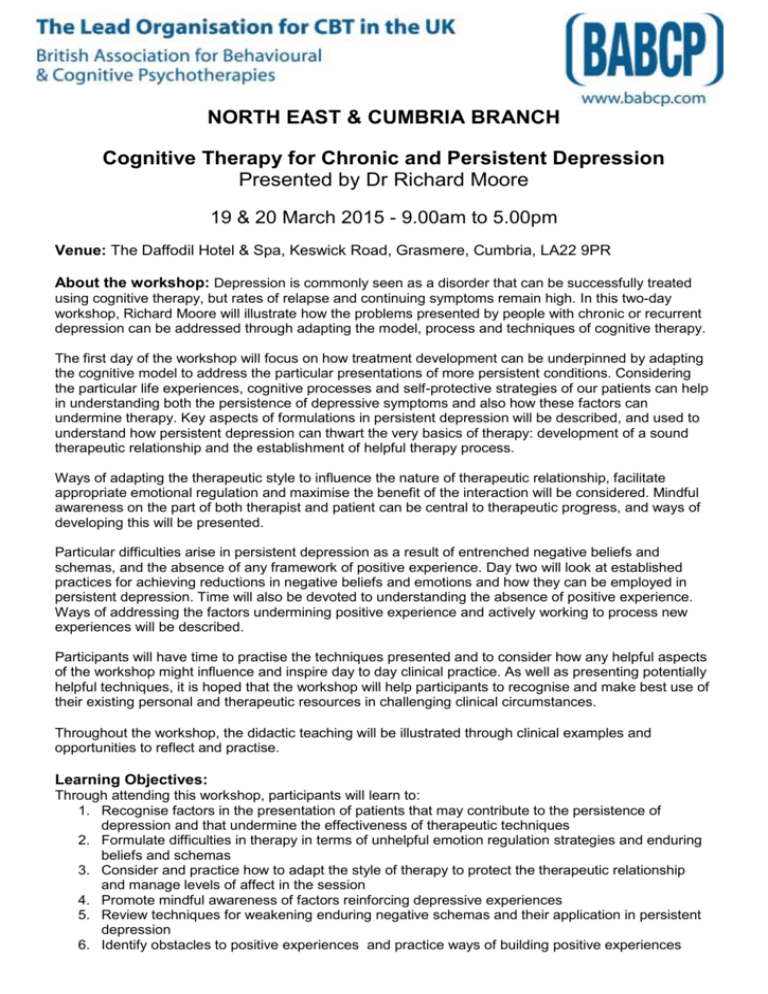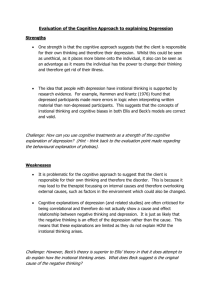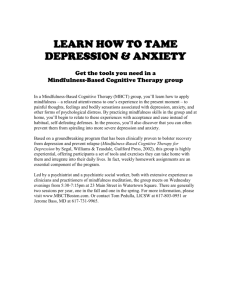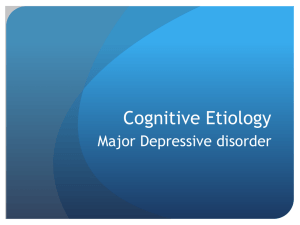North East & Cumbria Branch
advertisement

NORTH EAST & CUMBRIA BRANCH Cognitive Therapy for Chronic and Persistent Depression Presented by Dr Richard Moore 19 & 20 March 2015 - 9.00am to 5.00pm Venue: The Daffodil Hotel & Spa, Keswick Road, Grasmere, Cumbria, LA22 9PR About the workshop: Depression is commonly seen as a disorder that can be successfully treated using cognitive therapy, but rates of relapse and continuing symptoms remain high. In this two-day workshop, Richard Moore will illustrate how the problems presented by people with chronic or recurrent depression can be addressed through adapting the model, process and techniques of cognitive therapy. The first day of the workshop will focus on how treatment development can be underpinned by adapting the cognitive model to address the particular presentations of more persistent conditions. Considering the particular life experiences, cognitive processes and self-protective strategies of our patients can help in understanding both the persistence of depressive symptoms and also how these factors can undermine therapy. Key aspects of formulations in persistent depression will be described, and used to understand how persistent depression can thwart the very basics of therapy: development of a sound therapeutic relationship and the establishment of helpful therapy process. Ways of adapting the therapeutic style to influence the nature of therapeutic relationship, facilitate appropriate emotional regulation and maximise the benefit of the interaction will be considered. Mindful awareness on the part of both therapist and patient can be central to therapeutic progress, and ways of developing this will be presented. Particular difficulties arise in persistent depression as a result of entrenched negative beliefs and schemas, and the absence of any framework of positive experience. Day two will look at established practices for achieving reductions in negative beliefs and emotions and how they can be employed in persistent depression. Time will also be devoted to understanding the absence of positive experience. Ways of addressing the factors undermining positive experience and actively working to process new experiences will be described. Participants will have time to practise the techniques presented and to consider how any helpful aspects of the workshop might influence and inspire day to day clinical practice. As well as presenting potentially helpful techniques, it is hoped that the workshop will help participants to recognise and make best use of their existing personal and therapeutic resources in challenging clinical circumstances. Throughout the workshop, the didactic teaching will be illustrated through clinical examples and opportunities to reflect and practise. Learning Objectives: Through attending this workshop, participants will learn to: 1. Recognise factors in the presentation of patients that may contribute to the persistence of depression and that undermine the effectiveness of therapeutic techniques 2. Formulate difficulties in therapy in terms of unhelpful emotion regulation strategies and enduring beliefs and schemas 3. Consider and practice how to adapt the style of therapy to protect the therapeutic relationship and manage levels of affect in the session 4. Promote mindful awareness of factors reinforcing depressive experiences 5. Review techniques for weakening enduring negative schemas and their application in persistent depression 6. Identify obstacles to positive experiences and practice ways of building positive experiences About the speaker: Dr Richard Moore is a clinical psychologist with a specialist interest in CBT for depression born from many years’ experience of conducting therapy; of training and supervising; and of research on therapy. His initial training in clinical psychology at Cambridge and Edinburgh Universities was followed by a Training Fellowship at Beck’s Centre for Cognitive Therapy in Philadelphia. This provided the basis for his conducting the therapy in three successful RCTs of Cognitive Therapy for depression, which all demonstrated the benefit of CT in addressing the problems of persistent symptoms and recurrences of depression. For 17 years, he has dedicated himself to providing and supervising Cognitive Therapy within NHS secondary care services in Cambridge, specialising in the treatment of persistent depression. This has encompassed work in a variety of settings, including in a psychological treatment service, in community teams and in a specialist depression service; work in out-patient and in-patient settings; and working with individual and group formats. He has recently set up in private practice in Cambridge, offering training, supervision and consultation as well as individual therapy. He is co-author with Anne Garland of Cognitive Therapy for Chronic and Persistent Depression (Wiley, 2003), and has published a number of articles on research and therapy. He has presented workshops at numerous conferences and meetings. As well as summarising the research literature, his workshops remain grounded in addressing day to day clinical realities in order to bring about improvement in this hard to treat disorder. He invariably tries to bring some humour to what can otherwise be a gloomy topic and a passion for conveying how cognitive therapists can help in some of the cases where things seem most stuck. References: McCullough, J.P. (2000). Treatment for Chronic Depression: Cognitive Behavioral Analysis System of Psychotherapy. New York: Guilford Press. Moore, R., & Garland, A. (2003). Cognitive Therapy for Chronic and Persistent Depression. John Wiley: Chichester, West Sussex. Venue Information: The Daffodil Hotel is offering a limited number of rooms at a preferential rate for delegates attending this event. This will be on a ‘first come, first served’ basis. If you would like to take advantage of this, please contact the hotel directly and make them aware that you are an event attendee when booking. Website - www.daffodilhotel.co.uk Telephone - 01539 463550 Registration Fees BABCP Members - £140 Non Members - £180 Prices include lunch and refreshments and CPD certificates will be issued. Registration closes 12 March 2015. Once your completed registration form and payment have been received you will be emailed confirmation of your booking. If you choose the invoicing option your place will only be booked and confirmed on receipt of payment.





